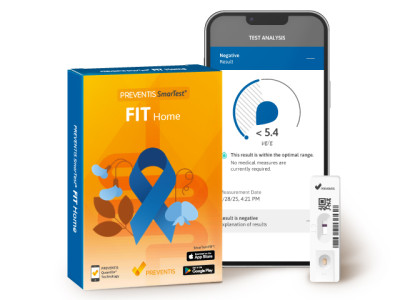New DKFZ Study Confirms That Smartphone-Based Self-Testing Offers Comparable Performance to Laboratory FIT in Detecting Advanced Neoplasia
Despite widespread availability of screening colonoscopy and laboratory-based fecal immunochemical tests (FIT), colorectal cancer (CRC) screening uptake remains low. In Germany, fewer than 20% of eligible adults participate regularly in screening programs (Darmkrebs Früherkennung, Darmkrebs Screening). In contrast, organized programs such as in the Netherlands achieve over 70% participation, largely due to accessible, low-threshold testing options.
A recently published study by Hoffmeister et al. (2024), conducted by the German Cancer Research Center (DKFZ) and published in Clinical Gastroenterology and Hepatology, shows that a smartphone-based FIT test — specifically the Preventis SmarTest® FIT Home — can serve as a scientifically valid alternative or supplement to conventional laboratory FIT in everyday clinical practice.
This innovation represents a compelling opportunity for general practitioners and gastroenterologists to increase screening compliance and improve early detection rates through at-home CRC testing.
Study Design & Results: Comparing Smartphone-Based and Laboratory FIT
The study was conducted within the established BLITZ colonoscopy cohort (2021–2023) in Southern Germany. A total of 654 asymptomatic participants scheduled for screening colonoscopy were invited to perform both:
- A smartphone-based FIT test (Preventis SmarTest® FIT Home)
- A standard laboratory-based FIT
Key results:
- Participation in smartphone FIT: 361/654 (55%)
- Valid result achieved: 274/361 (76%)
- High user acceptance: 89% found the test a valuable alternative
- Sensitivity for advanced neoplasia:
- Smartphone FIT: 28%
- Laboratory FIT: 34%
- Specificity: 92% for both tests
These results demonstrate that a Colorectal Cancer Self-Test conducted using a smartphone app can yield comparable diagnostic performance to traditional FIT methods, with the added benefit of ease of access and immediacy.
The authors conclude that the test “could represent a meaningful supplement to conventional colorectal cancer screening,” highlighting its suitability for primary care implementation.
Clinical Interpretation: What This Means for Medical Practice
While FIT tests are not as sensitive as colonoscopy, their benefit lies in broad population applicability and repeated annual use. This study affirms that Preventis SmarTest® FIT Home performs similarly to lab-based FIT tests while offering a highly accessible, self-administered format.
Key performance highlights:
- Quantitative immunological test using gold-conjugated anti-hemoglobin antibodies
- Cut-off: 9.6 µg hemoglobin/g stool
- Sensitivity for advanced neoplasia (SmarTest): 31.5% (internal data)
- Specificity: 93%
- Analytical sensitivity: 2.1 µg/g stool
- No cross-reactivity with dietary hemoglobin sources
- Result in ~20 minutes, directly on the patient’s smartphone
This Smartphone-based stool test for colorectal cancer eliminates the need for sample transport, external analysis, or in-person appointments — making it ideal for general practice, particularly for:
- Non-responders to standard screening invitations
- Patients hesitant to attend medical appointments
- Use in remote or resource-limited settings
- Offering a At-Home Colorectal Cancer Test during routine health visits
Enhancing CRC Screening Compliance Through Digital Diagnostics
Participation remains one of the greatest barriers in Colorectal cancer prevention. Providing a At-Home FIT Test that is scientifically validated, user-friendly, and app-guided can:
- Reduce patient hesitation
- Increase privacy and convenience
- Strengthen adherence to annual CRC testing
- Reach underserved populations
The Preventis SmarTest® FIT Home supports these goals while providing quantifiable, accurate results — fully aligning with current CRC prevention strategies.
This approach is a Colorectal Cancer App Test in the truest sense: empowering patients to “detect colorectal cancer with their smartphone” (Darmkrebs erkennen mit dem Handy) — and helping providers deliver smart diagnostics in healthcare.
Practical Use in General Practice & Gastroenterology
The study confirms that physicians can safely recommend smartphone-based FIT to average-risk adults eligible for stool-based CRC screening. The test is suitable for inclusion in:
- Preventive check-ups
- Screening reminders
- Telemedicine consultations
- Digital health programs
No dietary restrictions or test scheduling is required — the test can be completed independently by the patient within 20 minutes.
The SmarTest® FIT Home is also supported by patient-friendly digital guidance, reducing the likelihood of user error and increasing test reliability.
Preventis: Scientific Partner in Digital CRC Diagnostics
At Preventis, we believe in rethinking diagnostics to enable accessible, evidence-based, and empowering health decisions. With SmarTest® FIT Home, physicians gain access to a proven solution to improve CRC screening coverage in a format that aligns with modern patient behavior and expectations.
We support clinicians in implementing smartphone-based FIT testing — from informational materials to onboarding into existing workflows.
Contact our team to explore integration into your practice, receive scientific background, or request evaluation sets.
Together, we can transform Colorectal Cancer Screening through smart, patient-centered diagnostics.

